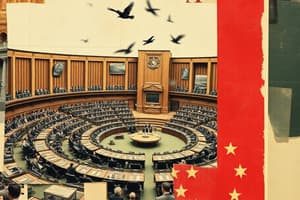Podcast
Questions and Answers
Which institution of the European Union is primarily responsible for proposing legislation?
Which institution of the European Union is primarily responsible for proposing legislation?
- European Council
- European Commission (correct)
- European Parliament
- Council of the European Union
What role does the European Parliament play in the legislative process of the EU?
What role does the European Parliament play in the legislative process of the EU?
- It adopts European legislation proposed by the European Commission. (correct)
- It manages the day-to-day business of the EU.
- It serves as the executive branch of the EU.
- It has the exclusive right of initiative for legislation.
Which statement accurately describes the European Council?
Which statement accurately describes the European Council?
- It has direct legislative power over EU matters.
- It manages the everyday administrative duties of the EU.
- It defines the policy agenda for the EU. (correct)
- It is solely responsible for proposing new treaties.
How are the members of the European Commission selected?
How are the members of the European Commission selected?
What is the role of the European Parliament concerning the European Commission?
What is the role of the European Parliament concerning the European Commission?
What is the primary mission of the Council of Europe?
What is the primary mission of the Council of Europe?
Which body is primarily responsible for enforcing the European Convention on Human Rights within the Council of Europe?
Which body is primarily responsible for enforcing the European Convention on Human Rights within the Council of Europe?
What does the Commissioner for Human Rights within the Council of Europe primarily do?
What does the Commissioner for Human Rights within the Council of Europe primarily do?
When was the European Court of Human Rights established?
When was the European Court of Human Rights established?
Which of the following statements is true regarding the membership of the Council of Europe?
Which of the following statements is true regarding the membership of the Council of Europe?
Flashcards are hidden until you start studying
Study Notes
Council of Europe
- Established in 1949 to promote human rights, democracy, and rule of law in Europe.
- Comprises 47 member states, representing a population of approximately 820 million.
- Operates with an annual budget of around 500 million euros.
- The European Court of Human Rights is the most recognized body, enforcing the European Convention on Human Rights.
- Two main statutory bodies are the Committee of Ministers (foreign ministers) and the Parliamentary Assembly (members of national parliaments).
- The Commissioner for Human Rights is an independent entity focused on human rights awareness and respect.
- Headed by a Secretary General overseeing the organization's secretariat.
European Court of Human Rights
- Established on January 21, 1959, based on Article 19 of the European Convention on Human Rights.
- Ensures compliance by contracting states with the Convention and its protocols.
- Hears applications alleging violations of human rights under the Convention.
- Can issue judgments and advisory opinions.
- All 47 member states of the Council of Europe are contracting parties to the Convention.
European Parliament
- One of three legislative branches of the European Union and part of its seven institutions.
- Works jointly with the Council of the European Union to adopt legislation, primarily based on proposals from the European Commission.
- Lacks formal right of initiative; this is reserved for the European Commission.
European Commission
- Acts as the executive branch of the European Union, with responsibilities for proposing legislation and managing EU operations.
- Commissioners swear an oath at the European Court of Justice, committing to uphold treaties and remain independent in their duties.
- Proposed by the Council of the European Union and appointed by the European Council after obtaining approval from the European Parliament.
- Based in the Berlaymont building in Brussels, with teams known as "cabinets."
European Council
- Recognized in the Lisbon Treaty, tasked with providing direction for the EU's development.
- Shapes the EU's policy agenda, often referred to as the engine for European integration.
- Holds appointment powers, including naming its President, the High Representative for Foreign Affairs, and the President of the European Central Bank.
- Proposes a candidate for President of the European Commission to the European Parliament.
- Lacks direct legislative authority but can invoke an "emergency brake" procedure in specific situations.
Studying That Suits You
Use AI to generate personalized quizzes and flashcards to suit your learning preferences.




